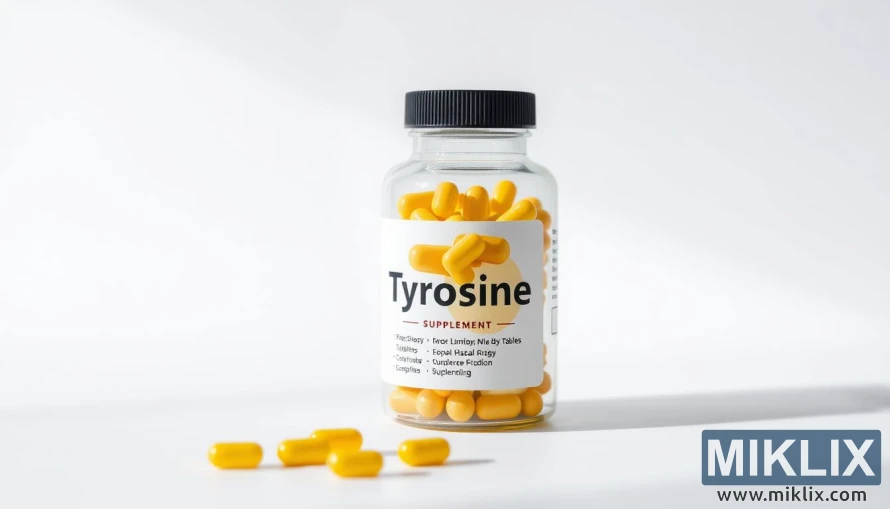Mood, Motivation, Metabolism: Why Tyrosine Deserves a Spot in Your Supplement Stack
Published: June 25, 2025 at 11:20:37 AM UTC
Tyrosine, a non-essential amino acid derived from phenylalanine, is increasingly recognized for its broad benefits when taken as supplements. It is linked to enhanced mental performance, mood regulation, and cognitive improvement. Tyrosine supplements are also believed to support physical performance under stress. This piece examines the advantages of Tyrosine and the scientific evidence supporting its effectiveness. It aims to help you understand how Tyrosine can improve focus and stress management, guiding your decision to include it in your daily routine.

Key Takeaways
- Tyrosine is essential for neurotransmitter production in the brain.
- Supplements can support improved mental clarity and focus.
- They may assist in managing stress effectively.
- Tyrosine can positively influence mood and emotional well-being.
- Adequate intake is essential for optimal physical performance.
- Natural food sources can complement Tyrosine supplements.
Introduction to Tyrosine Supplements
Tyrosine supplements are gaining traction for those aiming to boost mental and physical prowess. This amino acid is a precursor to vital neurotransmitters like dopamine and norepinephrine. Grasping the basics of Tyrosine is vital for those contemplating supplementation. It's key to its role in cognitive functions, stress management, and overall health.
Many seek Tyrosine supplements to sharpen focus, combat fatigue, and stabilize mood. The array of options available demands careful selection of high-quality products. Whether in capsule, powder, or drink form, users can find a format that suits their needs.
Research continues to highlight Tyrosine's role in mental performance. Delving into its mechanisms and body functions aids in making informed decisions about supplementation.
What is Tyrosine?
Tyrosine is an amino acid that plays a critical role in the body. It is synthesized from phenylalanine, another amino acid found in various food sources. This essential compound is necessary for producing important hormones and neurotransmitters, including dopamine, norepinephrine, and epinephrine. These substances are vital for regulating mood, attention, and the body’s stress response.
Incorporating a sufficient amount of Tyrosine in your diet can have significant implications for mental and emotional well-being. It is commonly found in high-protein foods such as:
- Dairy products
- Meat
- Nuts
- Beans
Understanding what is Tyrosine and its functions can lead to greater awareness of the Tyrosine benefits for both cognitive function and emotional health. This amino acid contributes to several physiological processes, making it an essential component of a balanced diet.

How Tyrosine is Produced in the Body
The body's production of Tyrosine involves complex metabolic processes. Phenylalanine, an essential amino acid, undergoes enzymatic reactions mainly in the liver. This results in the synthesis of Tyrosine. This conversion is critical in amino acid metabolism, enabling various physiological functions.
Several factors influence Tyrosine synthesis. These include dietary intake of phenylalanine-rich foods and an individual's metabolic health. A diet lacking in protein or specific amino acids can impede Tyrosine production. Grasping the details of this process can help understand conditions affecting Tyrosine levels. It also guides necessary dietary or lifestyle changes for optimal health.
The Role of Tyrosine in Neurotransmitter Production
Tyrosine is vital for making several key neurotransmitters, like dopamine and norepinephrine. These neurotransmitters are essential for our mood, focus, and how we handle stress. When we're stressed or need to concentrate hard, having enough Tyrosine and neurotransmitters is even more critical.
The journey of making neurotransmitters starts with Tyrosine turning into L-dopa, then into dopamine. Dopamine can then be converted into norepinephrine. This shows Tyrosine's key role in keeping neurotransmitter levels right.
Many people notice the effects of Tyrosine in tough situations. Studies show that taking supplements can help keep our minds sharp and improve performance under stress. Adding Tyrosine-rich foods or supplements to our diet might help balance our neurotransmitters better.

Potential Mental Performance Benefits
Research shows that Tyrosine can greatly improve mental performance, most noticeably under stress. When the brain faces stress, neurotransmitter levels drop, affecting cognitive function. Tyrosine replenishes these neurotransmitters, leading to enhanced brain health and cognitive abilities.
Studies have highlighted the cognitive benefits of Tyrosine, showing significant improvements in working memory and cognitive flexibility. Those who took Tyrosine supplements performed better in challenging mental tasks than those without it. This indicates that Tyrosine can be a valuable tool for boosting cognitive performance.
Tyrosine and Stress Management
In today's fast-paced world, managing stress effectively is key for overall well-being. Tyrosine has emerged as a valuable tool for stress alleviation, supporting mental performance during challenging times. It plays a significant role in synthesizing neurotransmitters, essential for mood regulation and cognitive functions.
Research shows Tyrosine benefits under stress by boosting the brain's ability to handle demanding situations. Acute stress can compromise neurotransmitter production. Tyrosine supplementation may help replenish these compounds, promoting mental clarity and focus.
Many clinical studies have highlighted Tyrosine's positive effects during heightened stress periods. Participants showed improved cognitive performance after consuming Tyrosine. This indicates its effectiveness in maintaining mental acuity, even when the brain faces resource constraints.
For those seeking to manage stress levels, Tyrosine offers promising benefits. It stands as a valuable option for boosting mental resilience amidst life's pressures.

Effects of Tyrosine on Mood and Depression
Tyrosine has caught the eye for its possible mood-boosting effects. This is due to its role in making neurotransmitters like dopamine and norepinephrine. Research shows a link between Tyrosine and mood, as these neurotransmitters are key for emotional health.
Research on Tyrosine for depression shows mixed results. Some studies suggest that those with low neurotransmitter levels might see mood improvements with Tyrosine. This is more likely when neurotransmitter deficiencies are present.
Though the evidence on Tyrosine's mood-enhancing effects is not uniform, its role is noteworthy. Those looking for a natural way to support their mood might consider Tyrosine. It's important to remember that professional advice is essential for addressing mood issues.
Tyrosine and Physical Performance
Tyrosine, a non-essential amino acid, is often found in sports supplements aiming to boost physical performance. While some believe Tyrosine can enhance physical performance, the scientific consensus is not clear-cut. Studies have investigated Tyrosine's role in exercise, focusing on its ability to increase endurance and reduce fatigue.

Research suggests Tyrosine might be beneficial in scenarios where stress or fatigue are significant. It could improve cognitive function during intense workouts, indirectly benefiting physical performance. Athletes in high-pressure situations might find Tyrosine aids in maintaining mental clarity and focus, potentially leading to better exercise outcomes.
Yet, many studies have found no substantial evidence that Tyrosine supplementation alone significantly enhances physical performance. This ambiguity highlights the need to consider Tyrosine as part of a holistic approach, combining it with other supplements and training methods. Further research is necessary to fully understand Tyrosine's role in physical activities.
Health Considerations and Side Effects of Tyrosine Supplements
Tyrosine supplements are generally recognized as safe (GRAS) when taken at recommended dosages. Despite this safety profile, individuals should remain mindful of several important health considerations. One key aspect involves the possibility of Tyrosine side effects, such as gastrointestinal discomfort, headaches, and fatigue. These effects can vary among individuals, making it essential to monitor any changes after starting supplementation.
Another significant point relates to Tyrosine interactions with certain medications. For instance, those taking monoamine oxidase inhibitors (MAOIs) or thyroid medications should exercise caution. The combination of these medications with Tyrosine could lead to heightened blood pressure or unintended side effects. Levodopa, often used in Parkinson's disease treatment, may also interact negatively with Tyrosine, affecting its efficacy.
Consulting a healthcare provider remains a vital step for individuals considering Tyrosine supplementation. This discussion ensures a complete understanding of personal health conditions and mitigates risks associated with Tyrosine interactions. Staying informed about both benefits and possible side effects enables users to make educated decisions regarding their health.
Recommended Dosages for Tyrosine
Finding the right Tyrosine dosage can differ greatly from person to person. Most experts recommend taking 500 to 2,000 mg daily. This amount is often suggested for use before stressful events or intense physical activities.
Several personal factors influence the right Tyrosine intake. These include body weight, how active you are, and any health issues you might have. For example, more active individuals might need higher doses. Those with certain health conditions might need a customized plan.
It's always best to talk to a healthcare professional about your Tyrosine dosage. They can help find the perfect amount for you. This ensures you get the most out of Tyrosine supplements safely and effectively.
Foods Rich in Tyrosine
Incorporating Tyrosine-rich foods into your diet can help maintain healthy levels of this essential amino acid. Various Tyrosine food sources provide the necessary nutrients to support overall wellness and cognitive function. A balanced diet with adequate dietary Tyrosine may offer similar benefits to supplementation.
Some excellent sources of Tyrosine include:
- Chicken and turkey
- Dairy products like cheese, yogurt, and milk
- Fish such as salmon and tuna
- Nuts, including almonds and walnuts
- Beans and legumes
- Whole grains like oats and wheat
Ensuring a variety of these foods in your daily meals can enhance your nutrition while promoting optimal Tyrosine levels. By focusing on these food sources, you can naturally meet your Tyrosine needs and support your body's overall function.
Who Should Consider Tyrosine Supplements?
Tyrosine supplements can benefit many, aiming to boost mental and physical performance. They are ideal for those under stress, like students during exams or professionals with high-pressure jobs. Athletes and fitness buffs may also benefit, as tyrosine aids in endurance and recovery.
For those with mood disorders, such as anxiety or mild depression, tyrosine might help improve mood and cognitive abilities. Yet, it's vital for individuals with pre-existing health issues, like psychiatric disorders or thyroid problems, to seek medical advice before using supplements.
Conclusion
Summarizing Tyrosine, this amino acid is notable for its role in boosting cognitive function, managing stress, and stabilizing mood. Its benefits are most significant for those in demanding situations or looking to sharpen their mental focus.
While Tyrosine's advantages are compelling, it's critical to handle supplementation with care. Seeking advice from healthcare professionals is key. This ensures that any performance enhancement aligns with one's health, avoiding the pitfalls of misuse or excessive intake.
Integrating Tyrosine-rich foods into your diet is a natural approach. Yet, as we wrap up, it's essential to consider your unique health situation. This careful consideration will help achieve the most effective results.
Further Reading
If you enjoyed this post, you may also like these suggestions:
- From Gut Health to Weight Loss: The Many Benefits of Glucomannan Supplements
- Barley Benefits: From Gut Health to Glowing Skin
- Hazelnuts Uncracked: The Tiny Nut with Mighty Health Perks
